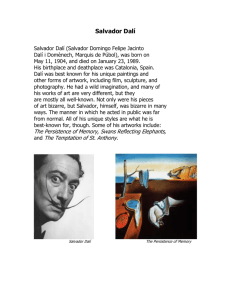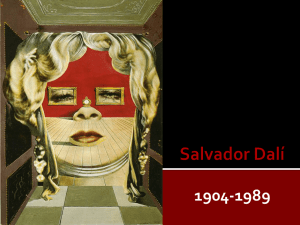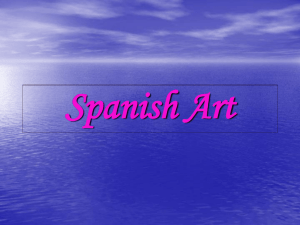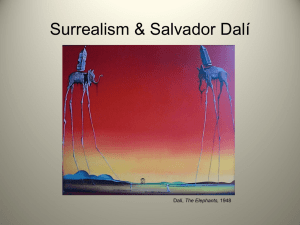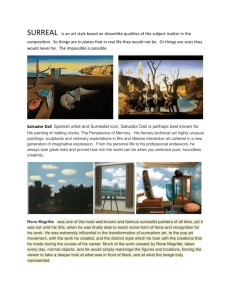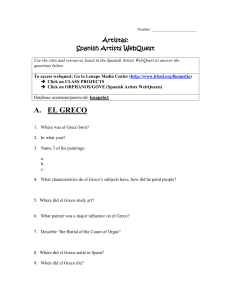Media Processing in the Network Wei Tsang Ooi
advertisement
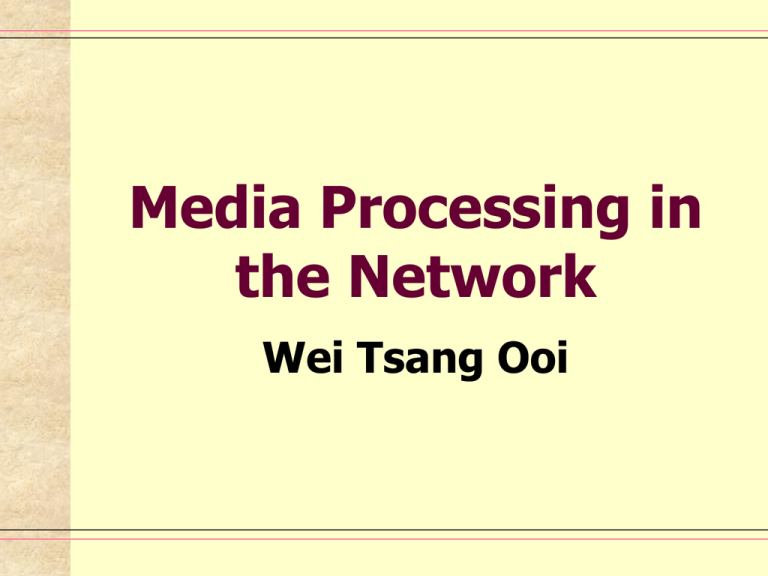
Media Processing in
the Network
Wei Tsang Ooi
Research Area
How
to build multimedia network
applications ?
Outline
Dalí
Multimedia Library
Problems and related work
Research proposal
Question
How
to build multimedia network
applications ?
Dalí
Current Solutions
black
box library code
easy to write but too high level
need finer optimization, resource
control
write
from scratch
too time consuming
What is Dalí
A
small set of simple, fast, reusable
primitives and abstractions for
image, audio and video processing
Example: Black Box Code
gd
GIF programming library 1.3
gdImagePtr im;
FILE *in;
in = fopen("mygif.gif", "rb");
im = gdImageCreateFromGif(in);
fclose(in);
gdImageRectangle(im,0,0,8,8,red);
Example: Dalí code
f = fopen(argv[1], "r");
BitStreamFileRead(bs,f,0);
BitParserWrap(bp, bs);
GifSeqHdrParse(bp, sh);
rmap = ImageMapNew();
gmap = ImageMapNew();
bmap = ImageMapNew();
n = GifSeqHdrGetCtSize(sh);
GifCtParse(bp,n,rmap,gmap,
bmap);
ih = GifImgHdrNew();
ph = PnmHdrNew();
status = GifImgFind(bp);
GifImgHdrParse(bp, ih);
h = GifImgHdrGetHeight(ih);
w = GifImgHdrGetWidth(ih);
r = ByteNew(w, h);
g = ByteNew(w, h);
b = ByteNew(w, h);
i = ByteNew(w, h);
GifImgParse(bp,sh,ih,i);
ImageMapApply(rmap,i,r);
ImageMapApply(gmap,i,g);
ImageMapApply(bmap,i,b);
Dalí : Abstraction
Byte
Image
Audio Buffer
Bitstream
MPEG Headers
JPEG Headers
Lookup Table
Bit
Image
DCT Image
Vector Image
Convolution
Kernel
Dalí : Abstraction
Byte
Image
Audio Buffer
Bitstream
MPEG Headers
JPEG Headers
Lookup Table
Bit
Image
DCT Image
Vector Image
Convolution
Kernel
Byte Image
Two
dimensional array of bytes
Can be either physical or virtual
physical
image
virtual
image
Composable Abstraction
Byte
images can be used to
represent:
Gray scale images
RGB images
YUV images
Alpha channels
Example Code : Fractal
image
newh
smaller
neww
smaller = byte_new (neww, newh);
byte_shrink_2x2(image,smaller);
target
image
dx
2dy
newh
smaller
neww
target = byte_clip(image,0,0,dx,2*dy);
byte_set(target,0);
target = byte_clip(image,3*dx,0,dx,2*dy);
byte_set(target,0);
target
image
dx
2dy
newh
smaller
neww
target = byte_clip(image,dx,0,neww,newh);
byte_copy(smaller,target);
image
newh
smaller
neww
target = byte_clip(image,2*dx,2*dy,neww,newh);
byte_copy(smaller,target);
target = byte_clip(image,0,2*dy,neww,newh);
byte_copy(smaller,target);
Dalí strategies
specialized
byte_shrink_2x2
memory
sharing
byte_clip
explicit
primitives
memory allocation
byte_new
Dalí : MPEG headers
seq gop
hdr hdr
pic
hdr
gop
pic
gop
hdr
pic
hdr
...
gop
pic
...
seq
end
Dalí : MPEG headers
seq gop
hdr hdr
pic
hdr
gop
pic
gop
hdr
pic
hdr
...
gop
pic
...
seq
end
Basic Header Primitives
find
parse
skip
dump
encode
Example
Skip
to the n-th frame
for (i = 0; i < n; i++) {
mpeg_pic_hdr_find(bs);
mpeg_pic_hdr_skip(bs);
}
Dalí: Bitstream
chunk of memory
1011001
parser
Mode of Operations
File
i/o
static memory
parser
fread/fwrite
Mode of Operations
Network
static memory
parser
socket
Mode of Operations
Memory
map
entire file
parser
Strategies
expose
MPEG headers
explicit
structure
I/O
Bitstream abstraction
Novel Features of Dalí
explicit
I/O
explicit memory management
predictable performance
programs are highly reconfigurable
push semantics to programmer
composable primitives, abstractions
Other Features of Dalí
fast
easily
extensible
support wide ranges of formats
(GIF, JPEG, MPEG-1, WAV, AVI, ..)
Dalí : Status
Currently
in alpha release
C, Tcl and Java binding
Better performance than other
tools (e.g. Rivl, mpeg_play)
Back to the question ..
How
to build a multimedia network
applications ?
Breaking it up ..
on one
machine
capture
process
compress
source
on two
machines
capture
process
store
receiver
compress
decompress
display
Optimization
on one
machine
8 bit colors,
10 frame/s
capture
process
compress
source
on two
machines
capture
process
store
receiver
compress
decompress
display
Optimization
on one
machine
8 bit colors,
10 frame/s
capture
process
compress
store
8 bit colors,
10 frame/s
on two
machines
capture
process
compress
decompress
display
Optimization
What
if there are more than one
receiver, and they have conflicting
requirements ?
Problem and
Current Solutions
Problem
Network
heterogeneity
100Mbps
S
36kbps
128kbps
R3
R1
R2
Suggested Solution
Layered
Multicast
streams are hierarchically encoded
each layer is multicast into a group
incrementally combine the layers to
refine the quality of the streams
Example
Layer 1
Layer 2
Layer 3
Layered Multicast
100Mbps
S
36kbps
128kbps
layer 1,2 R3
R1
layer 1,2,3,4,5
R2
layer 1
Layered Multicast
Receivers
find out if they can join
the next higher layer by
experiments
Join the layer, if packet drops/low
throughput detected, leave it
Problems
Needs
layered encoding
More groups means more states to
maintained
Uses a lot of multicast addresses
Alternative Approach
Move
computation into the network
where to run ?
when to run ?
how to specify the computation ?
Related Work
QOS
Filters (Yeadon 96)
where to run ?
when to run ?
how to specify the computation ?
Filters
transform
one or more input
streams into an output stream
Examples :
drop frames
decode frames
mix input audio
transcode to lower quality
Architecture
R1
S
filters
filters
flow spec
session mgr
R2
Architecture
ack
R1
S
filters
filters
session mgr
R2
Architecture
data
R1
S
filters
filters
session mgr
R2
Filter Propagation
Filter Propagation
Answers
QOS
Filters
where to run ?
filter
servers
when to run ?
when
resource(out) < resource(in)
how to specify the computation ?
pick
a pre-determine filter
Related Work
Active
Service (Amir et.al 98)
where to run ?
when to run ?
how to specify the computation ?
Active Services
MeGa
Clients
Vic
need MeGa
Servlets
Active
Servers
Servlets : MeGa
An
application level video gateway
Transcodes MJPEG to H.261
Written using Mash
next generation multimedia network
toolkit
built on tcl
AS Location
S1
bottleneck
R1
S2
R2
S3
R3
MeGa
Active Service
Where
active server at bottleneck
When
to run ?
when receiver requested it
How
to run ?
to specify a computation ?
request for pre-determine servent
Problems
How
to specify computation ?
Not easily extensible
Significant extension requires manual
installation of servlets/filter
Where
to run ?
AS : statically located
Proposal
The answers should be
How
to specify a computation ?
receivers can inject customized
programs into network
Where
to run ?
can be specified by users or
dynamically place itself
Thesis Proposal
active
media network (Medan)
allow customizable media processing
code to be injected into the network
application:
self-adaptive transcoder (SAT)
Medan
Medan node
source
receiver
prog
Medan
Medan node
source
receiver
prog
Medan Components
media
processing language
active network kernel
user interface
Language Requirements
Safe
& portable
Support common format/ops
Fine grain operations
distributed processing possible
Explicit
resource usage
resource management and admission
control
Dalí : How does it fit ?
Features
of Java Dalí:
safe and portable
Features
of Dalí :
thin primitives
predictable
explicit memory allocation
explicit I/O
Claim:
Dalí
is a suitable programming
language for Medan
Medan Components
media
Dalí
active
network kernel
???
user
processing language
???
interface
Medan Components
media
Dalí
active
network kernel
JKernel, SANE, etc.
user
processing language
???
interface
Medan Components
media
Dalí
active
network kernel
JKernel, SANE, etc.
user
processing language
interface
Mash
Medan: Todo
Engineering
issues
make Mash, Dalí, and active network
environment talk to each other
Mash
encoder,
Mash decoder,
objects etc.
source
sink
video capture,
network
video display,
network
Mash + Dalí
Dalí
Dalí
Mash + Dalí + AN
Dalí
Safe environment
Medan:
Problems to be solved
Resource
usage determination
Load balancing
Deployment
Security*
Resource management*
Medan Application:
Self-adaptive
Transcoder (SAT)
Injected into the network when a
session starts
Perform bandwidth adaptation by
transcoding session’s packets
SAT Scenario
SAT Scenario
congested
SAT Scenario
congested
SAT Features
transparent
to receivers
one group per session
lower latency
Basic algorithm
each
host who joined a group will
receive at an initial rate
each node will report it’s state
(congested, under-utilized) to it’s
parent
parent will adapt sending rate
accordingly
Problems to be solved
Detail
algorithm
Scalability
Reflect receiver’s interest
Interaction between programs
Deployment
More Problems
Flexible
transcoding algorithm
Congestion detection
Other Medan Applications
Remote
Sensing
Multimedia Database
Video Conference Auto-Editing
Receiver Heterogeneity
Contributions
Dalí
: a media processsing library
Medan : a framework for active
media processing in the network
SAT : apply Medan to solve the
network heterogeneity problems
Summaries
How
to build multimedia apps
Adding the word “network”
Current solutions and problems
Proposal
Where Medan is going..
Computation
can organized itself
(divided, pipelined, factored) into
sub-computations
Packets can carry computation
Capsules
Mobile Code
The End
